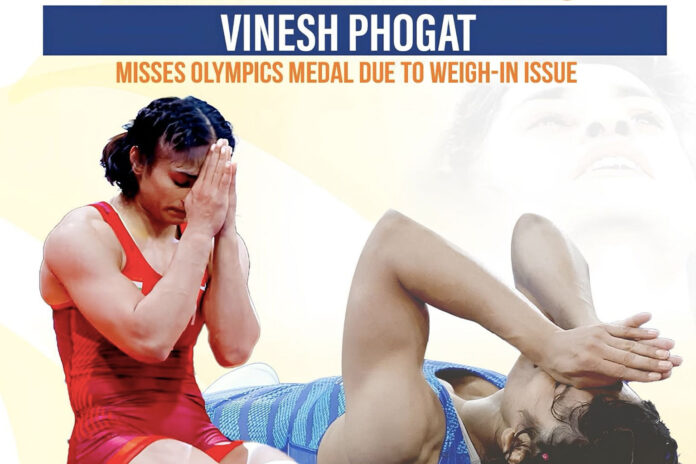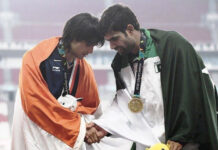In a heart-wrenching twist of destiny for Vinesh Phogat, the wrestler has been disqualified from the Paris Olympics after she could not pass the weight limit for her 50 kg category, on the morning of her Gold medal wrestling finals. Incredulously Vinesh was disqualified for being overweight by just 100 grams!
Before being disqualified, the Indian wrestler was guaranteed a silver medal at the least, as she had reached the 50 kg wrestling finals at the Olympics.
So what happened? And what is a weight limit in Olympic wrestling? And what is the story behind the 100 gram weight mess?
Shocking Announcement
The Indian Olympic Association on Wednesday made the shocking announcement of Vinesh Phogat’s disqualification from the 50kg Olympic wrestling final bout saying “It is with regret that the Indian contingent shares news of the disqualification of Vinesh Phogat from the Women’s Wrestling 50kg class. Despite the best efforts by the team through the night, she weighed in a few grams over 50kg this morning. No further comments will be made by the contingent at this time. The Indian team requests you respect Vinesh’s privacy. It would like to focus on the competitions on hand.”
Later it was revealed that the wrestler was a mere 100 grams over the permissible limits of 50kg, which resulted in the disqualification.
According to competition rules, after disqualification Phogat is now not eligible even for a silver medal.
The International Olympic Committee later confirmed that Phogat will be replaced by Yusneylis Guzman, the Cuban wrestler she defeated in the semi-final, in the finals.
“According to article 11 of the International Wrestling Rules, Vinesh will be replaced by the wrestler who lost against her in the Semifinal. Therefore Guzman Lopez Yusneylis (CUB) will compete in the Final. Repechage SUSAKI Yui (JPN) vs LIVACH Oksana (UKR) will become the Bronze Medal Match,” the IOC statement read.
Phogat’s coach and Indian Olympic contingent medical officers took several drastic measures before her weight testing, even going as far as cutting her hair and shortening the length of her clothes, but in this Olympics 100 grams weight proved too heavy a burden during the weight measurement before the finals.
What is Olympic weight limit?
In the Olympics, wrestlers, boxers and combat sport athletes have weight categories in which they participate. These categories have rules in place that don’t allow athletes above that weight to participate in that competition. Essentially, sport does not want a bigger athlete to compete against a smaller athlete. But sometimes bigger athletes choose to cut weight, that is rapidly losing a set number of kilos before competition. It’s quite a common practice in combat sports.
When do wrestlers get their weight measured?
According to United World Wrestling’s (UWW) Olympics weigh-in rules, wrestlers have to weigh in on the morning of their competition. But before the weigh-in on Day 1, a wrestler is supposed to appear at a medical examination with their licence and accreditation, while wearing their singlet. The weigh-in period is 30 minutes on Day 1 and a wrestler can try weighing themselves multiple times. On Day 2, if applicable, a wrestler has 15 minutes to make the weight and this too is done on the morning of the competition.
Vinesh Phogat will not medal at the Paris Olympics. The Indian 50 kg wrestler failed to make a crucial second weight cut on Wednesday morning, to be able to take part in the gold medal bout.
Why was it tough for Vinesh Phogat to cut weight?
Vinesh has always struggled to cut weight for the 50kg category. She had been participating in the 53 kg category until recently before she made the switch to 50 kg. The switch was made at the trials in NIS, Patiala. Phogat’s usual weight is around 55-56 kg, which she has to cut to 50 kg on the days of competition. Keeping her body weight below 55-56 kg has proved to be quite tough as there isn’t much more weight to cut and cutting water weight by sweating out has proven to be extremely challenging for the Indian wrestler.
Why was she disqualified despite making the weight on the first day?
UWW rules state that an athlete needs to make the weight on all competition days. Since the Olympic wrestling competition in a weight category is held over two days, Vinesh needed to weigh 50kg or under on both days. And since she was not able to do so on Day 2, she was disqualified.
According to UWW, “If an athlete does not attend or fails the weigh-in (the 1st or the 2nd weigh-in), he will be eliminated from the competition and ranked last, without rank. If an athlete is injured during the first day, he doesn’t have to attend the second weigh-in and will keep his results.”
Could Vinesh have salvaged a medal if she was injured?
According to UWW, if an athlete is injured during the first day, he/she doesn’t have to attend the second weigh-in and will keep his/her results. In Vinesh’s case, she would have got the silver medal.
Vinesh Phogat will not medal at the Paris Olympics. The Indian 50 kg wrestler failed to make a crucial second weight cut on Wednesday morning, to be able to take part in the gold medal bout.
Why do Olympic wrestlers have to weigh in on two days?
At the Olympics, starting rounds to semi-finals take place on the first day, and the gold medal and repechage rounds on the next day. If an Olympic wrestler has matches on the second day, they are bound to weigh in again on the second day, since they will be competing on that day as well.
Was a two-day weigh-in always the rule?
No. In 2017, the UWW changed the format of Olympic wrestling. So instead of the competition in a weight category being conducted all in a day, they moved to a two-day system. This was done so that athletes wouldn’t lose a huge amount of weight on one day and compete.
Vinesh Phogat will not medal at the Paris Olympics. The Indian 50 kg wrestler failed to make a crucial second weight cut on Wednesday morning, to be able to take part in the gold medal bout.
How can a wrestler weigh two kilos higher on Day 2, after weighing 50 kg on Day 1?
Most wrestlers rely on extreme weight cutting measures in the last few days before a competition. This involves not loading any carbohydrates, not drinking water, and intense exercising. The main way a body loses weight quickly is through losing water. Many combat athletes often try to use saunas and cover themselves up and exercise in order to make the body produce more sweat.
In the case of two-day Olympic wrestling, Phogat weighed 50 kg on the first day and was able to compete. But through the day, the last couple of kgs that she had lost came back. She then spent the entire time after competition on Day 1 to Day 2’s morning weigh-in trying to get her body to cooperate but missed out by a few grams.
India lodges strong protest
Prime Minister Narendra Modi has personally asked the Indian Olympic Association President, famed athlete (retd.) PT Usha to lodge a strong protest with the International Olympic Committee.
Whether the disqualification decision will be reversed remains to be seen but it is highly unlikely.
Meanwhile Phogat’s wrestling fate and Olympic destiny hang in the balance.










